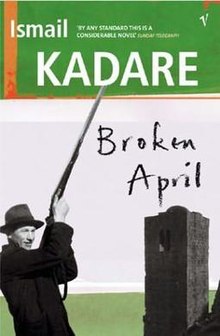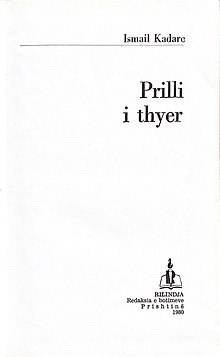Broken April
 Cover of the November 2003 paperback edition. | |
| Author | Ismail Kadare |
|---|---|
| Original title | Prilli i Thyer |
| Translator | New Amsterdam Books |
| Language | Albanian |
| Publisher | Librairie Arthème Fayard |
Publication date | 1978 |
| Publication place | Albania |
| Media type | Paperback |
| Pages | 192 |
| ISBN | 0-09-944987-0 |
| OCLC | 52919441 |
Broken April (Albanian: Prilli i thyer) is a novel by Albanian author Ismail Kadare. Published in 1978, the book explores one of Kadare's recurring themes: how the past affects the present.[1] The novel concerns the centuries-old tradition of hospitality, blood feuds, and revenge killing in the highlands of north Albania in the 1930s. It was translated into English by John Hodgson for New Amsterdam Books in 1990.[2]
Plot
[edit]
Gjorg Berisha, a 26-year-old Albanian man living on the country's high plateau,[3] is forced to commit a murder under the laws of the Kanun to avenge his brother. As a result of this killing, his own death is sealed; he is to be killed by a member of the opposing family.[1]
The novel concerns about the centuries-old tradition of hospitality, blood feuds, and revenge killing in the highlands of north Albania in the 1930s.[4][5]
Reading "Broken April", it is easy to understand why and with what strength Ismail Kadare is passionate about tragedy and its two most prominent representatives, Shakespeare and Aeschylus. "Friendship, loyalty, and feud are the wheels of the mechanism of ancient tragedy, and to enter into their mechanism is to see the possibility of tragedy."[6]
Reception
[edit]Broken April was lauded by reviewers upon its release. The New York Times, reviewing it, wrote: "Broken April is written with masterly simplicity in a bardic style, as if the author is saying: Sit quietly and let me recite a terrible story about a blood feud and the inevitability of death by gunfire in my country. You know it must happen because that is the way life is lived in these mountains. Insults must be avenged; family honor must be upheld...."[7] The Wall Street Journal declared Kadare "one of the most compelling novelists now writing in any language."[8] Reading "Broken April", it is easy to understand why and with what strength Ismail Kadare is passionate about tragedy and its two most prominent representatives, Shakespeare and Aeschylus. "Friendship, loyalty, and feud are the wheels of the mechanism of ancient tragedy, and to enter into their mechanism is to see the possibility of tragedy."
Adaptations
[edit]In 2001, a movie adaptation of Broken April, called Behind the Sun (Abril Despedaçado), was filmed in Brazil. It was made by filmmaker Walter Salles. Set in 1910 Brazil and starring Rodrigo Santoro, it was nominated for a BAFTA Award for Best Film Not in the English Language and a Golden Globe Award for Best Foreign Language Film.[9]
Footnotes
[edit]- ^ a b Liukkonen, Petri. "Ismail Kadare". Books and Writers (kirjasto.sci.fi). Finland: Kuusankoski Public Library. Archived from the original on 13 January 2015.
- ^ Apter, Emily (2001). Translation in a Global Market. Duke University Press. ISBN 978-0-8223-6492-4.
- ^ "Broken April - Ismail Kadare". Longitude. Archived from the original on 2 February 2017. Retrieved 7 October 2007.
- ^ Merle Rubin (24 October 1990). "Albanian Revenge". The Christian Science Monitor.
- ^ David Bellos (15 December 2020). "Why Should We Read Ismail Kadare?". World Literature Today.
- ^ "Gjenerali i ushtrise se vdekur". Bukinist (in Albanian). Retrieved 7 July 2022.
- ^ Mitgang, Herbert (12 December 1990). "Books of The Times; An Albanian Tale of Ineluctable Vengeance". The New York Times.
- ^ Broken April - Ismail Kadare. Amazon.com. 16 June 1998. ISBN 978-1-56131-065-4. Retrieved 6 October 2007.
((cite book)):|work=ignored (help) - ^ Kehr, Dave (21 December 2001). "AT THE MOVIES; Albanian Plot in Brazil". The New York Times.
Text is available under the CC BY-SA 4.0 license; additional terms may apply.
Images, videos and audio are available under their respective licenses.
